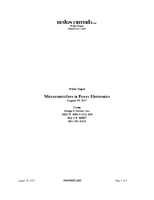Rockwell Automation Joins Initiative to Bring OPC UA to Field-Level Devices
MILWAUKEE, November 29, 2018 — Rockwell Automation is joining an OPC Foundation initiative to extend the OPC UA protocol to field-level industrial communications.
Under the initiative, a series of working groups are being formed to bring the OPC UA protocol’s vendor-independent, end-to-end interoperability to field-level devices. The initiative plans to address use cases not currently in scope for EtherNet/IP. It could also simplify other use cases, especially in multi-vendor, controller-to-controller environments and for the vertical integration of field devices.
“Rockwell Automation has always supported the development and use of open standards,” said Paul Brooks, business development manager, Rockwell Automation. “Extending the OPC UA protocol to the field level or shop floor can help simplify system development and accelerate a company’s journey to a Connected Enterprise.”
As the primary author of the EtherNet/IP specifications, Rockwell Automation understands EtherNet/IP users may see compatibility risks in technology developed for a different ecosystem. The company intends to mitigate these risks through both its ongoing development of EtherNet/IP and its intentions for the OPC UA protocol.
Rockwell Automation’s priorities within the new OPC Foundation initiative include working to help ensure the following:
- OPC UA specifications are written with the same level of rigor and completeness as the EtherNet/IP specifications.
- Time-sensitive networking (TSN) is commonly applied across the OPC UA, EtherNet/IP and PROFINET protocols, so all three can coexist on a common TSN-based network.
- OPC UA pub/sub technology is implemented in a way that allows existing EtherNet/IP installations to support OPC UA devices.
- OPC UA hardware requirements allow the protocol to be deployed on hardware platforms that are common in today’s EtherNet/IP components.
- OPC UA software requirements allow the protocol to be deployed within current EtherNet/IP-centric software tools without significant changes to user workflows.
- Conformance test practices mandated for EtherNet/IP reflect the necessary requirements for OPC UA conformance testing.
“We are committed to these priorities to help make sure EtherNet/IP users have a choice of whether and when they migrate to the new OPC UA protocol,” Brooks said. “We want users to determine the pace of this migration based on the value that they receive, rather than technology choices made in the specification. We trust that others engaged in the initiative will share this common goal.”
About Rockwell Automation
Rockwell Automation Inc. (NYSE: ROK), the world’s largest company dedicated to industrial automation and information, makes its customers more productive and the world more sustainable. Headquartered in Milwaukee, Wis., Rockwell Automation employs approximately 23,000 people serving customers in more than 80 countries.
About the OPC Foundation
Since 1996, the OPC Foundation has facilitated the development and adoption of the OPC information exchange standards. As both advocate and custodian of these specifications, the Foundation’s mission is to help industry vendors, end-users, and software developers maintain interoperability in their manufacturing and automation assets. The OPC Foundation is dedicated to providing the best specifications, technology, process and certification to achieve multivendor, multiplatform, secure, reliable interoperability for moving data and information from the embedded world to the enterprise cloud. The Foundation serves over 600 members worldwide in the Industrial Automation, IT, IoT, IIoT, M2M, Industrie 4.0, Building Automation, machine tools, pharmaceutical, petrochemical, and Smart Energy sectors.
Media Contacts
Steve Ludwig
Rockwell Automation
440.646.4013
swludwig@ra.rockwell.com
Leanne Hanson
Padilla
612.455.1776
leanne.hanson@padillaco.com




